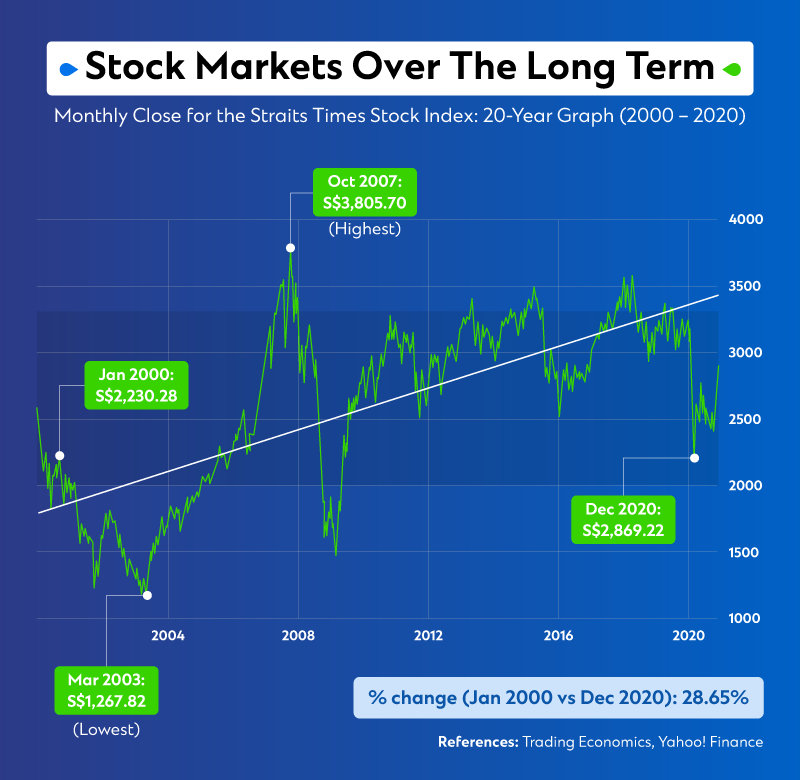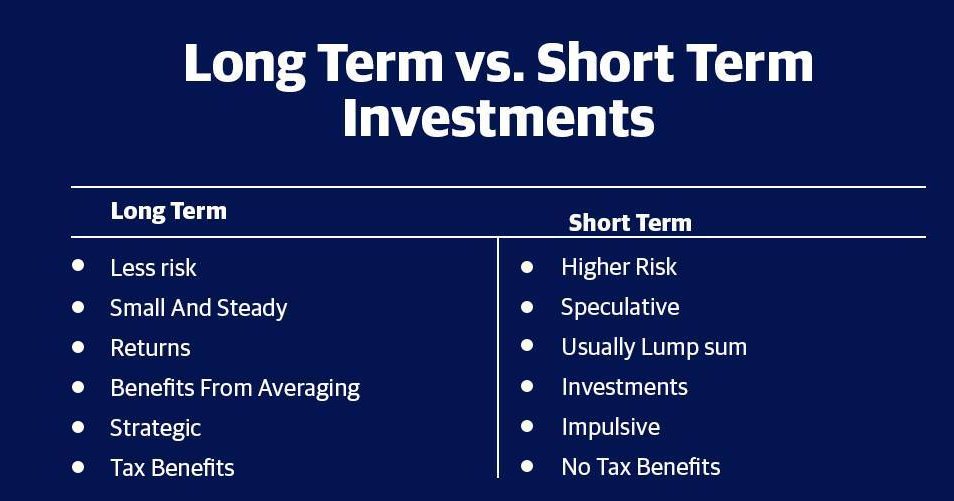In a fast-paced world where immediate gratification often takes precedence, long-term investing may appear counterintuitive.
Nevertheless, the rewards of long-term investing can be extraordinary for those willing to exercise patience and maintain their commitment. While engaging in day trading and pursuing short-term investments may offer the allure of rapid gains, they frequently entail elevated risk and stress levels.
In contrast, long-term investing empowers individuals to endure the market’s fluctuations, capitalizing on the benefits of compound interest and harnessing the potential of time. By adopting a long-term perspective, investors can attain heightened financial security, progressively amass wealth, and potentially secure a comfortable retirement.
Here we explore the many benefits of long-term investing and illustrate how patience can lead to financial success. Taking a farsighted approach to finances can bode well for your financial future.
Understanding the Power of Compounding
When considering long-term investment strategies, an essential aspect distinguishing them from short-term approaches is the remarkable potential of compounding. Compounding involves reinvesting earnings or returns, allowing them to generate further earnings or returns over an extended period. Essentially, it enables investment to produce earnings not only on the initial amount invested but also on the accumulated earnings from previous periods.
The true magic of compounding lies in its exponential growth. Over a considerable duration, even a modest rate of return can magnify into a substantial sum. For instance, imagine investing $10,000 in a fund that offers an average annual return of 8%. In the initial year, you would earn $800 in returns. However, in the following year, your returns would be calculated based on the initial $10,000, along with the $800 earned in the first year, resulting in a total investment of $10,800. Consequently, your returns in the second year would amount to $864. As time progresses, the compounding effect intensifies, leading to significant gains.
The importance of the commencement and maintenance of investments over time is evident through compounding. The longer your investment remains untouched, the more time it has to compound and grow. Due to this, it is required to invest early, even if the amount is modest. A compounding strategy can make a substantial difference to your long-term financial prosperity.
Advantages of Long-Term Investing
Financial Stability and Security
Financial safety and security are some of the main advantages of long-term holdings. Investors who adopt a long-term strategy can navigate market fluctuations without being influenced by short-term fluctuations. This stability empowers individuals to maintain control over their financial future, even during volatile periods.
Long-term investments are generally less susceptible to temporary market fluctuations as they are designed to endure ups and downs over an extended duration. This stability provides peace of mind, ensuring your investments are not at the mercy of daily market whims. Instead, you can focus on your long-term financial objectives, knowing that your assets will steadily grow over time.
Potential for Enhanced Returns
Despite the possibility of quick gains when investing short-term, long-term investing provides the opportunity for higher overall returns. Despite short-term volatility, the stock market traditionally exhibits an upward trend over the long term—investors who stay in the market for a long benefit from its growth.
In general, long-term investing doesn’t guarantee higher returns every year. There will still be phases of market downturns and volatility. You will likely enjoy the rewards of long-term market growth if you stay invested and allow your investments to accumulate over time. The key to maximizing your potential returns is patience and perseverance.
Diversification and Risk Management
One key advantage of long-term investing lies in its potential for asset allocation optimization and volatility protection. By distributing your investments across various asset categories, distinct sectors, and diverse geographic zones, you can minimize the influence of a singular investment’s performance on your comprehensive portfolio. This strategic asset dispersion acts as a safeguard against market volatility.
Asset allocation optimization can be realized through various strategies, such as incorporating a combination of equities, fixed-income securities, collective investment schemes, and tangible assets like real estate into your investment portfolio. The objective is to construct a harmoniously balanced portfolio, reflecting your personal risk threshold and financial aspirations. By spreading your investments this way, you are likely to decrease the effects of any single investment’s underperformance, thereby enhancing your likelihood of sustained long-term growth.
Avoiding Emotional Decision-Making
One of the critical obstacles investors encounter is the influence of emotions on decision-making. The fear of missing out or the anxiety of potential losses becomes easily swayed by market fluctuations or sudden changes. As a result, you may make impulsive investment decisions that aren’t aligned with your long-term goals.
Investing long-term calls for investors to take a step back and look at the big picture. By adopting a patient and calculated approach, you can avoid making hasty decisions based on short-term market movements. Instead, you can make well-informed choices grounded in thorough research, analysis, and a long-term outlook.
Maintaining course and composure during market downturns may pose challenges, but historical evidence reveals that markets tend to recover over time. By maintaining a long-term mindset, you can resist the temptation to sell during market downturns and potentially miss out on subsequent recoveries. This disciplined approach can significantly enhance your long-term investment outcomes.

Credit: sc.com
Strategies for Successful Long-Term Investing: Insights and Approaches
Start Early and Stay Consistent
Commencing your long-term investment journey at an early stage is paramount. Harnessing the potential of compounding requires ample time for substantial growth. By initiating early, you can capitalize on the possibilities of exponential expansion and establish a robust foundation for your financial future.
Consistency is equally vital. Regularly contributing to your investments through a retirement account, brokerage account, or other investment avenues enables you to harness the power of time. Automating your contributions, if feasible, ensures consistent investments irrespective of market conditions.
Set Clear Goals and Create a Plan
Specifying clear objectives and defining your strategy is crucial before investing in the long-term. Determine what you aim to accomplish with your investments, such as securing your retirement, funding your children’s education, or acquiring a home. Well-defined goals will guide your investment decisions and maintain focus amid market fluctuations.
Once your objectives are set, craft a comprehensive plan delineating the necessary steps. Consider your risk tolerance, time horizon, and investment preferences. If uncertain about strategizing, seeking guidance from a financial advisor can assist in tailoring an approach that aligns with your circumstances and aspirations.
Stay Informed and Educated
Investing involves constant evolution, necessitating the need to stay knowledgeable and continually educate yourself on prevailing market trends, investment tactics, and economic factors influencing your investments. Regularly perusing financial news, following reputable investment blogs, and staying up-to-date on market conditions empower you to make informed decisions and adapt your investment strategy accordingly.
Reading books, attending webinars, and taking investment courses can also be beneficial. Abundant materials are available that can deepen your understanding of long-term investing and provide you with confidence in navigating the financial markets.

Credit: twitter.com
Essential Points to Consider for Long-Term Investing Success
Investing long-term requires you to be aware of certain mistakes that can impede your progress. Avoid the following common mistakes:
Emotional Investing
As previously stated, allowing emotions to influence your investment decisions can negatively impact your long-term success. Avoid investing based on fear, greed, or short-term market fluctuations. Instead, prioritize your long-term objectives and make logical decisions based on robust financial principles.
Overreacting to Market Volatility
Fluctuations in the market are a natural occurrence when investing, and it’s important to refrain from overreacting to short-term market movements. Attempting to time the market or frequently buying and selling investments based on transient trends can yield unsatisfactory outcomes. Keep in mind that long-term investing entails staying the course and remaining invested, even during periods of market decline.
Neglecting Portfolio Diversification
Failure to diversify your investment portfolio exposes you to unnecessary risks. By allocating your investments across various sectors and asset classes, you can lessen the impact of poor performance from any individual investment. Diversification acts as a vital risk management strategy, safeguarding your investments and enhancing the probability of consistent long-term growth.
Exploring Long-Term Investing: Informative References
For individuals seeking to delve into long-term investing, many informative references are accessible to broaden their understanding. Here are a selection of recommended sources:
- Literary Works: Embark on a journey of enlightenment by perusing notable books such as “The Intelligent Investor” authored by Benjamin Graham, “A Random Walk Down Wall Street” written by Burton Malkiel, and “Common Sense on Mutual Funds” penned by John C. Bogle.
- The Internet: Research long-term investment strategies on websites such as Investopedia, Morningstar, and The Motley Fool.
- Financial Experts: Hire a financial advisor who knows long-term investing inside and out. By availing yourself of their expertise, you can receive tailored guidance customized to your unique objectives and circumstances.
Conclusion
In a world driven by the desire for immediate results, the concept of long-term investing may appear unconventional. Nevertheless, by adopting a patient mindset and committing to long-haul investments, individuals can unlock a host of advantages. Long-term investing offers the potential for compounding, financial stability, higher returns, risk management through diversification, and avoidance of impulsive decision-making, among other benefits.
Achieving success in long-term investing requires several key strategies:
- Initiating early investments.
- Maintaining consistency.
- Establishing clear goals.
- Formulating a comprehensive plan.
- Staying well-informed and educated.
- Navigating common pitfalls.
By implementing these approaches and using available resources, individuals can position themselves for long-term financial prosperity.
Therefore, take a moment to pause, resist the temptation of immediate gains, and embrace the strength of patience. It is crucial to remember that in the realm of long-term investing, gradual and unwavering progress ultimately leads to triumph. Your future self will undoubtedly express gratitude for this thoughtful approach.






Add Comment